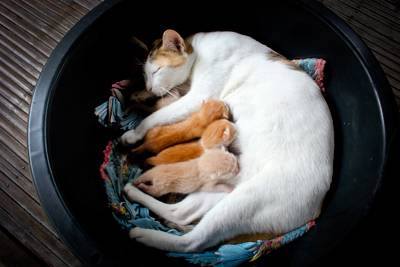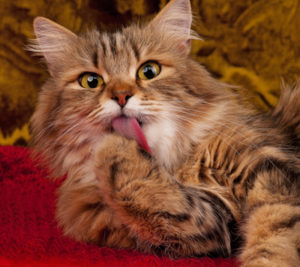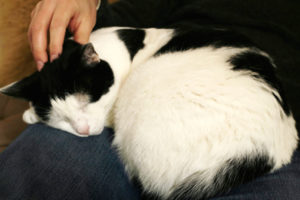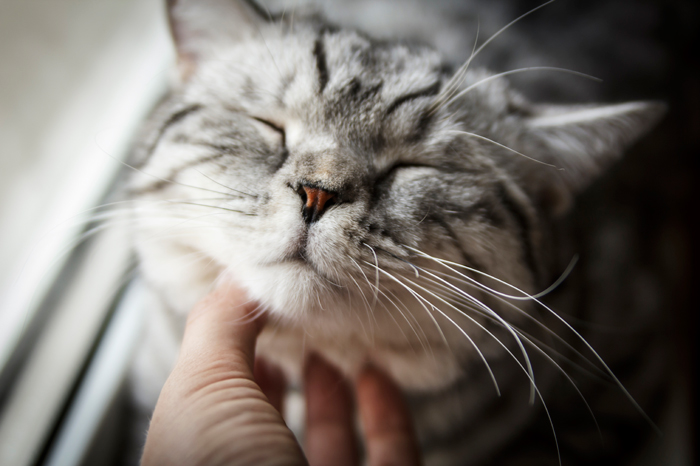Every cat owner has experienced the calming pleasure of having a purring cat curled up in her lap. A soothing, relaxing sound and sensation that can be felt as well as heard. Most people assume a purring cat is a contented cat, but the reasons cats purr are much more complicated than that.

Newborn kittens are blind and deaf, so purring is the first form of communication between mother and kitten. Kittens purr while nursing, and mom purrs back. Adult cats purr when they are happy, of course, but also when they want something from their humans, like food or attention. Humans respond to the sound because cats can modulate their purrs to a frequency similar to a baby’s cries.
Cats also purr to soothe themselves when they are frightened or injured; dying cats have been known to purr. Studies show that purring releases endorphins and accelerates healing. This aspect of purring arises from feline hunting patterns. Cats purr with a frequency between 25 and 150 Hertz, and sounds within this range can improve bone density and promote healing.1 Since wild cats spend long periods sleeping or being inactive between bursts of exertion to catch prey, the purr serves as a means to keep bones, tendons and muscles strong without exerting much energy. Scientists are looking into using devices that emit a purr-like sound frequency on humans who require bone-density maintenance therapy, such as astronauts who must remain weightless for long periods.

Tony Buffington, a cat expert and veterinarian at Ohio State University, is quoted on the Wired magazine website on the topic: “It’s naive to think that cats can only purr for one reason—it’s like thinking that people can only laugh for one reason.”
Every cat’s purr sounds different, just as people’s laughs do. I have three cats, and their purrs are very distinctive. My youngest cat, an active and intrepid shorthaired male named Mao, has a dainty purr you can only hear if you are very near him. Bootsie, a slightly plump ginger female of a certain age, has a purr of average volume. My small and timid Himalayan Persian, Thumper, sounds like a chainsaw. You can hear her across the room when she gets going.
Cats use the muscles in their larynxes and diaphragms to purr; the hyoid bone in the throat might also be involved. Scientists used to believe that cats who could roar couldn’t purr, but recent evidence shows that cheetahs, ocelots, cougars, and some other wild cats purr as well as roar. The biggest cats—tigers, lions, and leopards—roar but do not purr. Domestic cats are the only ones who can purr continuously, while both inhaling and exhaling.

Most cat owners already suspect that purring is good for people, too. Scientists agree. Cat ownership reduces stress and blood pressure, and studies have shown that people who live with cats have a significantly lower risk of heart attacks than people without cats. Since purring is a major factor in the pleasure cats give their owners, it is logical to assume purring contributes to better heart health for cat lovers. As St. Francis of Assisi, a well-known animal lover, remarked, “A cat purring on your lap is more healing than any drug in the world, as the vibrations you are receiving are of pure love and contentment.”
Source: 1. Scientific American
About the Author: Lisa King is a freelance writer living in Southern California. She is the former managing editor of Pet Product News International, Dogs USA, and Natural Dog magazines. Lisa is also the author of the well-received murder mystery novel “Death in a Wine Dark Sea” and the recently released “Vulture au Vin.”





